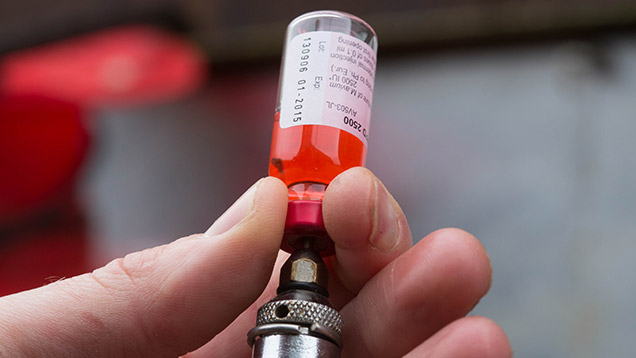Vets raise concern at TB test ‘perfect storm’
 © Tim Scrivener
© Tim Scrivener Farm vets have warned they could be driven out of business amid a perfect storm of falling incomes and loss of work following the government’s TB testing changes.
On-farm TB testing has previously been performed by vets working for private practices who were trained, appointed and paid by the Animal and Plant Health Agency to do the work.
But the government put the work out to tender claiming it would be more efficient and effective to have the tests carried out by fewer, larger umbrella bodies.
See also: Legal challenge to Defra TB testing tender award
In the South West, TB testing represented up to 40% of fee-income for veterinary practices, according to Richard Turner, a partner at St David’s veterinary practice near Exeter, Devon.
Many of those practices may now cease regular TB work altogether after Defra awarded the tender to XL Farmcare, an umbrella organisation under which different vet practices will operate.
“The move will slash our TB fees by over 30%,” claimed Mr Turner.
The reduction in fees would make TB testing unprofitable on anything but the largest dairy farms with good infrastructure, he added.
“No practice wants to walk away from their farms but vets are in a really difficult situation – this is a very serious problem in the making.
“It’s the perfect storm. Farmers themselves aren’t making much money, vets are facing falling incomes on every side of the business, and the government’s TB testing change could be the final nail in the coffin for some,” he said. “Large specialist farm practices like ours will survive, but smaller mixed practices will have to consider whether the income is worth the effort. I am worried that a considerable number might decide to stop farm work altogether, with a very serious effect on farm animal health.”
Dick Sibley, director of West Ridge Veterinary Practice, Tiverton, Devon, said that with farm profits under intense pressure, there would be little opportunity to raise fees elsewhere to keep farm vet practices going.
He predicted that vets would be drafted in from abroad to make testing cost effective.
“The reality is that we’ll have to look for cheaper employees, who will inevitably come from overseas,” he said.
However, a spokesman for APHA said the tender process was not solely based on cost. “The level of payment was arrived at by a fair and transparent competitive process, so we are satisfied that it is a realistic rate for the services to be delivered,” he said.
According to Phil Leighton from XL Farmcare Devon and Cornwall, almost 70% of veterinary practices in England who currently undertook TB testing had either signed up or registered their interest to continue doing so. “We believe that some smaller farm practices are working with their neighbouring practices to deliver a viable, high-quality, TB testing service to their farmers,” he said.
